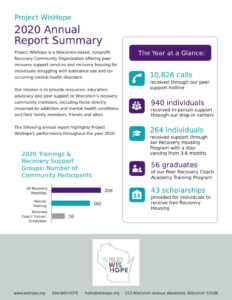Addiction often builds into frustration for individuals who hold on to their mistakes. The monotony of making the “same” mistake over and over or falling into a pattern of habits wears down one’s patience in the form of anxiety or—for those who resign efforts to affect change—depression. Advocating for the recovery of others coping with alcohol or substance use disorder allows individuals to work through instinctual self-criticism with the perspective of peer support.
By positioning oneself to interact with those experiencing the early stages of recovery, a coping individual might improve upon the “stinking thinking” of negative-leaning resentment. Helping another overcome the same obstacles encountered in one’s own recovery makes these hurdles seemingly equitable. With the objective viewpoint gained from another’s trials in familiar recovery territory, individuals understand more about their own tendencies while forgiving their own past misgivings.
As restorative as peer mentorship has the potential to be, by no means does that guarantee the process will be easy or fun. Instead, facing the prospect of vulnerable thoughts and fears surrounding addiction raises intensified exposure to the parts of addiction that are heavily steeped in doubt and guilt. Furthermore, exercising patience for others who succumb to the temptation of addiction might not prove as plentiful as the tolerance given to our own cause. The process of extending a bridge of encouragement to those treading not far behind us strengthens a community of acceptance rather than judgment.
UNDERSTANDING WITHOUT FIXING
Individuals seeking guidance from their peers within recovery look for different types of support. Moments of crisis might send coping individuals searching for validation, confidence, or, more often than not, merely a listening ear. Offering the space to discuss the challenges and joys of sobriety with an understanding ear and thoughtful feedback helps destigmatize fears of oversharing or burdening others with the weight of addiction.
Creating a judgment-free zone for discussing recovery can be life-changing to those who have never experienced sharing strategies to cope with alcohol or substance use disorder. Fostering a relationship or group based around judgment-free sharing isn’t easy, though. Here are some strategies to help build this open and vulnerable space.
- Availability: Share boundaries surrounding what availability you have and when you can be there as a confidante for recovery. Even if it may be obvious to you what your capacity to show up for others looks like, people may not know you are there as a resource.
- Ask about needs: Support takes different shapes depending on who is seeking it out. Ask exactly how those who are grappling with use disorder can use your assistance. Individuals often think they are assisting someone in recovery when, in reality, they might come across as “preachy” or “self-righteous.” Being open to communication means staying open to the needs of those seeking support.
- Don’t shame, reframe: Honest communication hits a wall when guilt interferes with truth. A common justification for deceit resides in an individual’s attempts to preserve a slipping sense of identity. To maintain open communication with others in recovery, avoid shaming the thoughts and actions of individuals coping with use disorder. Instead, reframe negative thoughts as actionable paths forward. How can the hardship of one moment transform into a hard-fought lesson in the future?
- Check-in before offering advice: Advice is a lot like a life preserver in that situation makes all the difference. When someone is thrashing in the water gasping for air, tossing a life preserver is a welcomed response to the individual struggling to tread water. However, throwing someone a life preserver when they are calmly enjoying a bagel might be met with confusion and frustration. Before launching into offering advice, check-in with the individual’s current state. Are they looking for advice or just an understanding ear to vent frustration? Both can be equally valuable.
- Encourage objective recognition of behavior: There will be many speed bumps and potholes on the road to recovery. Anyone struggling with their recovery can benefit from acknowledging their actions outside the framework of blame. Yes, we will likely notice a behavior/action/habit, but we should hesitate to blame it. Use disorder insinuates the limit of one’s control inherent to consciousness. In that vein, people are no more qualified to judge their actions—or the habits of others—than any other living creature.
The fear of judgment often snowballs into self-destructive behavior from one hurtful action into two, then three, and so on. Early on into admitting to alcohol or substance use disorder, open space to air the growing pains of addiction might be an oasis amid the desert of silent suffering. Using all of the available patience and resources to manage use disorder becomes necessary for those who may have never experienced support in this way. If you have experience—either personally or tangentially—with understanding the toll of addiction, providing any degree of empathy can affect personal development more than you might think. Don’t hesitate to share with those who are beginning their newfound path to recovery. If you are the one who is just starting this path, remaining open to all available resources will empower positive change. At WisHope, we know that recovery reveals many parts of identity that may differ from our perception of self. We offer a multitude of tools to grow this person within a prescribed recovery program. Our goal is to impact all aspects of addiction recovery both during and long after experiencing outpatient care. Don’t wait to get help—call us today at (844) 947-4673.


